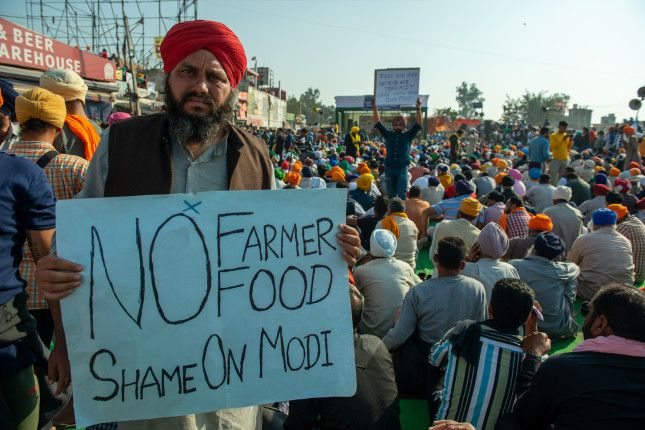On November 19, almost a year to the day when hundreds of thousands of farmers began to converge on the national capital of New Delhi in what turned out to be a year-long protest, the Bharitiya Janata Party (BJP) government announced that it would rescind the 3 farm Acts that had precipitated the protests. No one is in any doubt about what precipitated the retreat by a Prime Minister who until now has cultivated an image of never retreating, no matter how disastrous the decisions made by his government; elections are due for 5 state governments early in 2022, including in Uttar Pradesh and Punjab, two of the states that have seen the largest mobilizations of farmers.
This legislation would have made the farming sector captive to corporate interests, requiring farmers with relatively modest landholdings to sell their crops to agribusiness. In announcing the government’s retreat, Prime Minister Narendra Modi apologised, not for having passed legislation that would harm the interests of the almost 50% of Indians who make their living principally from the land, but for failing to convince farmers that this was in their best interests!
Forced through on a voice vote over opposition protests in September 2020, the farming legislation came hot on the heels of passage of the Citizenship Amendment Act (CAA) and the implementation of a National Population Register (NPR). Between them, these measures summed up the main agenda of this right-wing and Hindu majoritarian government: a neoliberal agenda of ‘opening up’ and ‘modernising’ the economy by giving corporate interests free rein in the agricultural sector (as has already happened in the manufacturing and service sectors); and furthering its Hindutva agenda by putting India’s large Muslim minority (almost 15% of the total population) on notice that their citizenship rights are precarious, and conditional.
The passage of the CAA was met by huge protests from Indian Muslims and also non-Muslim students, activists, intellectuals and others, which were ultimately dispersed by government repression, justified by a deadly wave of the Covid-19 pandemic. This was followed by riots that left many, a majority of Muslims, dead or injured as Delhi police, under the jurisdiction of the central government (New Delhi is not a full-fledged state but a Union Territory), looked on.
A few months later the farmers began to descend on Delhi in their hundreds of thousands, and when the BJP controlled state governments of Uttar Pradesh and Haryana denied them access to the capital by using roadblocks, baton-wielding police and water cannons, they set up camps on its borders, declaring that they would not disperse until their demands, including the repeal of the 3 farm Acts, were met. Scores of farmers organisations joined together in a United Front of Farmer’s Unions (the Samyukta Kisan Morcha or SKM). The leadership of the protests included many women, and the participation of women in farmers’ protests is one of the many remarkable features of the agitation, as are the free kitchens that were set up and which fed tens of thousands around the clock, without regard to class, caste or religion, for a year.
Over an exceptionally cold winter, a blistering summer and deadly waves of covid, the farmers remained in their makeshift camps, in the course of which more than 700 farmers have died, including 4 who were killed when a car allegedly including the son of a BJP Minister ploughed through protesting farmers in October. After some desultory negotiations early in the piece, the government refused to negotiate at all, and although the PM has made 7 overseas trips this year, he did not once drive a few kilometres to one of the border camps to discuss the legislation with the farmers. Instead, the government and senior members of the BJP vilified the protesters, whom they variously labelled as Maoists, separatists, anti-national traitors, thugs, and terrorists; one BJP leader claimed that protesting farmers were spreading avian flu by “eating chicken biryani and nuts”! They were joined in these condemnations by what has become a mostly pliant national media, large sections of it owned by the same corporate interests that stand to make a fortune from the farming Acts, including Mukesh Ambani, whose personal fortune of $85 billion is as much as the annual GDP of the state of Punjab. Unsurprisingly, the protester’s encampments had many placards that condemned the corporate media for their partisanship.
The struggle is not over. The SKM has announced that the protests will not cease until further demands are met, including the maintenance and extension of the ‘minimum support price’ (MSP) scheme, which as the name suggests, guarantees farmers a minimum price for certain produce, thereby protecting them in some measure from market fluctuations and corporate manipulations. Nonetheless, the BJP government backdown is of great significance, and is a glimmer of hope in an otherwise dismal political scene in India. As P. Sainath, India’s foremost journalist of rural affairs and founding editor of the independent People’s Archive of Rural India (https://ruralindiaonline.org/en/) has described it, “This isn’t just a win for the farmers. It’s a win for the battle for civil liberties and human rights. A win for Indian democracy.” Whether this is enough to save a faltering Indian democracy will be considered in a subsequent article.
The picture that illustrates this article is `A Sikh farmer showing an anti-government poster during a Farmer protest at the Singhu border in Haryana, India´, by PradeepGaurs, Shutterstock.com.
Sanjay Seth is Professor of Politics and Co-Director of the Centre for Postcolonial Studies at Goldsmiths, University of London. He has published extensively in the fields of postcolonial theory, modern Indian history, political and social theory, and international relations. His articles have appeared in a wide range of journals, including The American Historical Review, Journal of Asian Studies, Comparative Studies in Society and History, Social Text, Cultural Sociology, and International Political Sociology, and some of these have been translated into Portuguese and Spanish. He is a founding co-editor of Postcolonial Studies.



